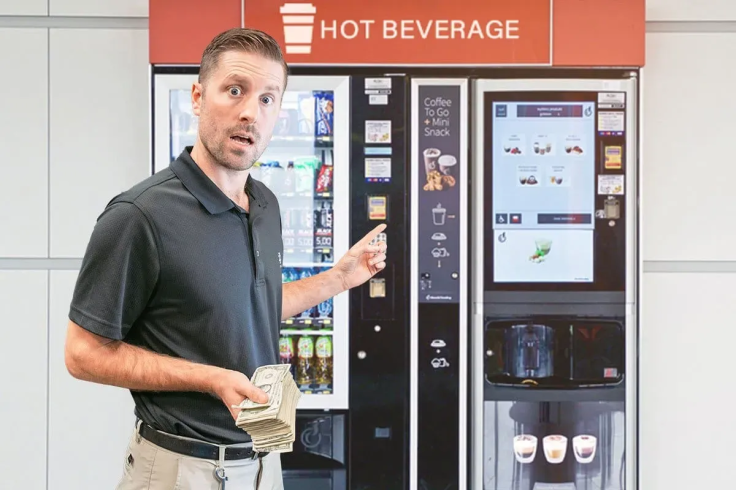This Guy Works Twice A Week and Earns $700K Yearly: Tips On Starting A Vending Machine Business
Finding strategic vending locations are key for success
Adam Hill wanted to break free from his corporate job and started a vending business out of all the industries. After eight years of smart work, the business now earns him above $50,000 in gross revenue every month. He started his venture way before the work-from-home policies and the booming gig culture.
In a podcast, Hill said he started Hill Vending solo without prior experience and made mistakes when choosing machines. However, he was able to turn those lessons into multiple profitable locations with over 100 machines. His idea of a vending business supposedly came from the vending machine guy at his previous workplace.
As his business scaled, he added more people to the company and expanded with new shops in over 40 strategic locations in Florida to store a wider variety of snacks and beverages. He operates warehouses, some of which are 1,600 square feet in size, for a decent monthly rent of $1,600.
For those who wanted to take this route, Hill said they could start a vending business with two or four machines from their home, garage, or a small storage unit. He even saw some people do this on their SUVs since it doesn't need a huge operation to begin with.
As a solo operator, Hill noted that you have to be there all the time like you are "handcuffed." After working alone for years, his brother joined a couple of years later, and soon another family member as the number of locations grew. A bigger team allowed him to take on more back-end tasks like accounting, finances, inventory, machine transports, and handling service calls.
Hill's Way of Managing a Vending Business
Hill said anyone who can acquire and maintain quality machines, place them in buzzing locations, offer balanced pricing and reliable services can flourish in the vending business.
Choosing the right vending machine is a must. It was one of the top challenges Hill faced when starting out. According to him, all machines are not the same. In an age where vending machines have credit card readers, old incompatible machines are becoming obsolete.
Given the lack of education about the vending industry, some retailers and manufacturers are still pushing out old machines into the market, which buyers must be wary of. Hill believes the first mistake to avoid is compromising the quality of the machine. Never do that, he says.
However, the best vending machines won't help if not placed in the right location. Hill stressed: "Vending is all about locations and foot traffic, meaning whether it's customers, employees, or visitors. The more people that come across a machine, the higher volume, the higher sales its going to produce."
When asked about his profit margins, he said: "So, you markup on a can of Coke, you at least need a 100% markup. You know, chips and snacks, everything's a little bit different." Hill also highlighted the 50-30-20 rule, where 50% of your income goes to the product, 30% is your and employees' salaries, and 20% is for miscellaneous like credit card fees, gas, and insurance costs.
They also have a box truck that services all machines every working day. When it comes to boosting sales, Hill said simply going out and talking to customers with a game plan is one of the cheapest and most effective ways at a nominal cost. To keep overall costs low, he believes in being as efficient as possible.
Source At The Best Price, Stick To One Vertical
Hill noted that there are several options for sourcing products. He can directly order from Coke or Pepsi, but that's very costly. He gets his products from Sam's Club, just a mile away from one of his stores. His goal is to get the best quality at the best price.
Secondly, he urges business owners to avoid trying to do too much. Hill said, "I was doing vending machines, frozen food machines, and coffee machines. I didn't have expertise in anything." Soon after, he realized he needed to "hyperfocus" on getting the snack machines down before he expanded into anything else.
He secured a route for $120,000 with a $60,000 downpayment and the rest was financed by the owner. Hill literally pooled money from family. He also recommended connecting with your network at schools, churches, and people you know to gauge if they require vending at work.
During a walkthrough, he showcased his new Vendo 721 machines, which hold a variety of products, as well as the refrigerated AMS machines, which can handle food or drinks. These machines are mainly sold through distributors in your area.
Ultimately, Hill believes that offering good service and buying quality machines is an industry gap they are trying to bridge at scale.
© Copyright IBTimes 2025. All rights reserved.























